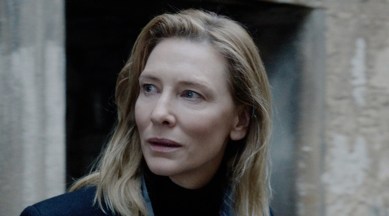Click here to follow Screen Digital on YouTube and stay updated with the latest from the world of cinema.

How does a Linda Tarr from Staten Island, New York, transform herself to become Lydia Tár, the toast of the western classical music world and the first woman to head the Berlin Philharmonic Orchestra? How many shoulders does she climb on along the way? How many heads does she step on? How many people she turns to and discards? Is there any other way?
Writer-director Todd Field mounts a montage of high-brow art and glossy, representational success, which hides behind it a complex network of unspoken power and favours. This is how it has always been, and Tár – having played the game herself – is hardly about to change it.
In a revealing, lengthy interview at the start of the film with The New Yorker’s Adam Gopnik (playing himself), Tár repeatedly refuses to be put into any category of gender or otherwise. Openly gay, she insists there have been other successful woman orchestra conductors who have paved the way for her, says she never faced any extra obstacles, talks about running a programme to help more join the field, but is more keen to venture on about the “art” itself.
“Time,” she says, “is everything”. So, if her left hand holds the baton and conducts the music, it is with her right that she controls the precise moments of it, bringing it to climax just when she wants to.
And then, time slips away from Tár. The film, with Cate Blanchett again in superb control in the central role, from haute to hauteur, horror to horrible, is about the downfall of this successful and celebrated composer-conductor, after things from the past start closing in on her present.
Her careless dalliances with younger musicians and admirers, her flirting that evokes the open resentment of her suffering assistant, Francesca (Merlant) – the keeper of many of her secrets, and a budding musician hoping to one day make it to the orchestra herself – Tár’s casual acceptance that her “wife” and the first violinist in her orchestra, Sharon (Hoss), might know of these affairs, all might finally be catching on.
There is a MeToo hint here, as well as a look at both sides of the cancel culture. At the pinnacle of her career, just one more performance away from a milestone, Tár finds that people are only too ready to take the art down with the artist. A comeuppance for the conductor who once brought down a Juilliard student, saying: “Don’t be so eager to be offended. The narcissism of small differences leads to the most boring kind of conformity.”
Latest reviews: Tu Jhoothi Main Makkaar | MH370 The Plane That Disappeared | 65
There is a heartbreaking descent into uncertainty, confusions of the mind, as Tár hears noises at night, sees things disappear, feels she is being followed, and finds herself falling for the charms of yet another ingenue (Kauer), who could this time be the one in control.
If the film is slow-moving and pretty long at more than two-and-a-half hours, if it rather savours its weighty discussions around music, what keeps Tár ticking is Blanchett. The way she desperately launches herself to get back to the podium she has worked so hard for, the extent to which her desire becomes desperation, the pain of her realisation of the depths within from which her music rose and is about to be lost, is a work of art.
Not to be separated from the artist – at all.
Tár movie director: Todd Field
Tár movie cast: Cate Blanchett, Nina Hoss, Sophie Kauer, Noémie Merlant
Tár movie rating: 4 stars
Click here to follow Screen Digital on YouTube and stay updated with the latest from the world of cinema.